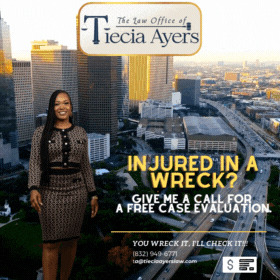Best Travel Accident Lawyers in Texas
Share your needs with us, get contacted by law firms.
Free. Takes 2 min.
Or refine your search by selecting a city:
List of the best lawyers in Texas, United States
About Travel Accident Law in Texas, United States
Travel accident law in Texas deals with the legal rights and responsibilities related to injuries and damages caused by accidents that occur while traveling. This includes vehicle collisions, airplane incidents, bus and train accidents, as well as injuries involving rideshare services or while traveling as a pedestrian. Texas laws establish who is at fault, what compensation may be available, and how claims should be filed. Understanding these laws is important for anyone who experiences or is affected by a travel-related accident in the state.
Why You May Need a Lawyer
Navigating the aftermath of a travel accident can be complex, especially when dealing with insurance companies, proving fault, and understanding detailed legal procedures. Common situations where a lawyer can help include:
- Disputes over who is at fault for the accident
- Disagreements with insurance companies over coverage or compensation
- Serious injuries requiring long-term medical care
- Fatal accidents resulting in wrongful death claims
- Accidents involving commercial vehicles or public transportation
- Complex multi-vehicle or multi-party accidents
- Challenges with gathering evidence and dealing with witnesses
Local Laws Overview
Texas applies several key laws and rules to travel accident cases:
- Fault and Comparative Negligence: Texas follows a modified comparative negligence rule, meaning if you are found to be 51 percent or more at fault for the accident, you cannot recover damages. Otherwise, your compensation is reduced by your percentage of fault.
- Statute of Limitations: Victims generally have two years from the date of the accident to file a lawsuit for personal injuries or property damage.
- Insurance Requirements: Drivers in Texas must carry minimum liability insurance. Depending on the mode of travel, additional insurance rules may apply, especially for commercial carriers or rideshare companies.
- Reporting Requirements: Serious accidents that result in injury, death, or significant property damage must be reported to law enforcement. Failing to report may impact your ability to claim compensation.
- Public Transportation and Rideshare Laws: Special liability and insurance rules may apply when accidents involve city buses, trains, taxis, or rideshare companies such as Uber and Lyft.
Frequently Asked Questions
What should I do immediately after a travel accident in Texas?
Ensure everyone's safety, call emergency services if needed, report the incident to authorities, gather witness information, document the scene with photos, and seek prompt medical attention.
Can I claim compensation if I was partially at fault?
Yes, Texas's comparative negligence law allows you to claim compensation if you are less than 51 percent at fault. Your award will be reduced by your degree of fault.
How long do I have to file a claim?
You have two years from the date of the accident to file a lawsuit for personal injury or property damage in Texas.
Who pays for my injuries if I am a pedestrian hit by a vehicle?
Typically, the at-fault driver's insurance should cover your injuries. If that coverage is insufficient, your own insurance or the driver’s personal assets may be used.
What if the accident involved a rideshare vehicle like Uber or Lyft?
Rideshare companies are required to carry specific liability insurance. The level of coverage depends on whether the driver was engaged in a ride at the time of the accident.
Do I need to report all travel accidents to the police?
Texas law requires reporting any accident resulting in injury, death, or significant property damage. Reporting also helps document the incident for insurance and legal purposes.
Will my insurance rates go up after an accident?
Insurance impact varies depending on fault and your policy. If you are found at fault, premiums may increase. If not at fault, some insurers will not raise your rates.
What happens if the other driver has no insurance?
You may still recover compensation through your uninsured motorist coverage or through a lawsuit against the at-fault party, though recovery can be more challenging.
Can I settle my case without going to court?
Most travel accident claims are settled outside of court through negotiations with insurance companies or the other party. Taking the case to court is typically a last resort.
How can a lawyer help me?
An attorney can help gather evidence, negotiate with insurers, accurately value your damages, handle paperwork, and represent you in court if needed to maximize your compensation.
Additional Resources
If you have been involved in a travel accident in Texas, these organizations and resources can provide information and support:
- Texas Department of Insurance - for information about auto and liability coverage requirements
- Texas Department of Transportation - for crash statistics, safety programs, and reporting procedures
- Local city or county law enforcement agencies - for accident reporting and police reports
- Texas State Bar Association - for referrals to qualified personal injury or accident attorneys
- Legal aid organizations in Texas - for those who may need free or reduced-cost legal assistance
- National Highway Traffic Safety Administration - for travel and transportation safety resources
Next Steps
If you or a loved one has been involved in a travel accident in Texas, consider the following steps:
- Seek any needed medical attention first
- Report the accident to law enforcement promptly
- Document everything: Take photos, gather witness statements, and keep all related paperwork
- Notify your insurance company
- Consult with an experienced Texas travel accident lawyer to review your legal options, especially if injuries are serious or fault is in dispute
- Follow all legal and medical advice to protect your health and your rights
Lawzana helps you find the best lawyers and law firms in Texas through a curated and pre-screened list of qualified legal professionals. Our platform offers rankings and detailed profiles of attorneys and law firms, allowing you to compare based on practice areas, including Travel Accident, experience, and client feedback.
Each profile includes a description of the firm's areas of practice, client reviews, team members and partners, year of establishment, spoken languages, office locations, contact information, social media presence, and any published articles or resources. Most firms on our platform speak English and are experienced in both local and international legal matters.
Get a quote from top-rated law firms in Texas, United States — quickly, securely, and without unnecessary hassle.
Disclaimer:
The information provided on this page is for general informational purposes only and does not constitute legal advice. While we strive to ensure the accuracy and relevance of the content, legal information may change over time, and interpretations of the law can vary. You should always consult with a qualified legal professional for advice specific to your situation.
We disclaim all liability for actions taken or not taken based on the content of this page. If you believe any information is incorrect or outdated, please contact us, and we will review and update it where appropriate.
Browse travel accident law firms by city in Texas
Refine your search by selecting a city.















